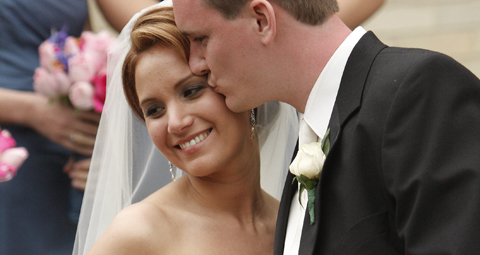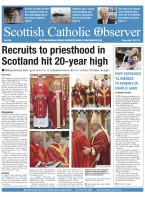April 21 | ![]() 0 COMMENTS
0 COMMENTS ![]() print
print

Will the exceptions to the rule lead to eliminating the rule altogether?
In the second part of a series on Pope Francis’ controversial Amoris Laetitia, Mgr Peter Magee looks at how, for some bishops, the division on the exhortation is one of doctrine and not just discipline
IT is difficult to deny that there is now some degree of division among the bishops across the universal Church on chapter eight of Amoris Laetitia (AL)—that is, on the question of access to the sacraments of Reconciliation and Eucharist for the divorced living in a new civil union or in some other exclusive sexual relationship. Some argue that it’s not a division about doctrine since the Pope and the Buenos Aires bishops (see part one) still teach that marriage is indissoluble and that adultery is morally wrong. It’s only a difference of views, they say, on how to put that doctrine into practice (otherwise known as ‘discipline’), to help people discern where they are and accompany them to where they should be.
So, are different practices in different places simply a reflection of the rich and complex reality of the Church and a way of respecting the vastly different and nuanced situations of individual people? Or are we seeing a change in practice which inevitably brings with it a change of doctrine, and of a doctrine which has hitherto been considered as unchangeable?
There are bishops who insist that no doctrine is being changed. There is, they say, merely a change in discipline. There are other bishops who say that chapter eight of AL introduces exceptions to the rule about granting access to the Sacraments to the divorced in new sexual relationships.
Those exceptions, they would say, do not prove that rule but eliminate it altogether. By implication, they also contend that to allow anyone in that situation to receive the Sacraments is in fact to lead them into error and to endanger their salvation. It is also to risk putting the salvation of the rest of the faithful in jeopardy. The exception can so easily become the rule.
So, what exactly is the doctrine at stake in this debate for those who see this as more than a matter of a change in discipline? At its source, it goes to Christ’s teaching about divorce and adultery: “Now I tell you that whoever divorces his wife, except for sexual immorality, and marries another woman, commits adultery” (Matthew 19:9). And again: “He answered, ‘Anyone who divorces his wife and marries another woman commits adultery against her. And if she divorces her husband and marries another man, she commits adultery’” (Mark 10:11-12).
As is often the case, however, one doctrine of the Faith has implications for others. The more central the doctrine at stake, the more it calls others into question.
For example, since the Church has until now always interpreted Christ’s words, just quoted, to mean that a divorced person in a new sexual relationship may not receive the Sacraments, a change in that interpretation logically raises questions about what Christ actually meant by his words about marriage and divorce.
Who is to say what Christ really meant at all and what his teaching implies, and can it be done in any definitive way?
Another question which follows is whether the Church has interpreted Christ wrongly until now. How do we know when the Church’s interpretation is right or wrong, definitive or not?
What is the Church’s authority anyway? Has she been true to it, true to Christ, true to her mission?
The Church’s discipline in prohibiting the divorced person in a new sexual relationship from receiving the Sacraments has always been taught until now as following on directly from the doctrine of Christ.
Hence, to now say that a divorced person in a new sexual relationship can receive the Sacraments is therefore to say in practice (in discipline) that marriage, divorce and adultery no longer mean what Christ meant as Christ has always been understood by the Church.
A development in understanding must be welcomed, because it matures and enriches the grasp of the original truth under the influence of the Holy Spirit. But a development which is in fact not a development, but a change, i.e. which contradicts the original truth, cannot be welcomed since, rather than evidence of growth in continuity, it shows rupture in discontinuity.
If AL involves a break with doctrine, even although it is said to be merely a change in discipline, it further raises questions about the authority of the papacy. Were earlier popes mistaken in their teaching about this matter?
Who is to say one pope, or one Council for that matter, is right and the other wrong? Can one pope or Council change something in the deposit of Faith? Does it have the authority? On the admission of women to the priesthood, the Church has declared that she does not have the authority to do so.
It would represent a change, not a development, of doctrine. The question arises: does the admission of the divorced and remarried to the Sacraments follow the same logic?
Another key question which arises concerns what is called communion among the bishops of the Church. When individual bishops, including the Bishop of Rome, or groups of bishops disagree with one another on this matter, and when some of them consider it a matter of revealed Faith, then one bishop could wonder if he is any longer in communion of Faith with another.
How does this question arise?
The doctrine on the admission of the divorced living in a new sexual relationship to the Sacraments goes to the very heart of Christ’s relationship with the Church.
Marriage as a sacrament shares in Christ’s faithful love until death for his spouse and mystical body, the Church. Marriage is also a missionary sign which shines that same love outward to the world.
The married thus stand closely united to the mystery of the Cross and to the mission of salvation. Christ takes the couple to himself and sets them up in union with himself as an objective and public sign of his love until death for the Church and for the world. When it comes to divorce and remarriage and to access to the sacraments of Reconciliation and the Eucharist, this stupendous gift of grace goes well beyond matters of personal conscience and considerations about the subjective degree of guilt of the person. The marriage bond, once it has been sealed, is not subject to the will of the spouses or to the ups and downs of life.
In marriage, the couple are caught up into a reality much greater than themselves, one which truly makes them greater as persons and as spouses, one to which they are called to conform and sacrifice their lives, for better for worse, for richer, for poorer, in sickness and in health until death doth them part.
But if one spouse, whilst the other is still alive, unites sexually with a third party who is not their spouse and sets up home with them, this gravely and objectively wounds and contradicts the truth of their marriage, irrespective of whether they are more or less guilty of their situation from the moral point of view.
To receive the Eucharist in this situation further contradicts the very truth of the Eucharist which is the Body of Christ, the groom, given in faithful love until death for the Church, His bride.
The admission of the divorced in a new sexual relationship to the Eucharist brings the wound inflicted on their marriage into their relationship with the Eucharist, with Christ himself. Hence the Church has always prohibited this objective contradiction without exceptions. For no matter how noble the intentions or tragic the circumstances, if this prohibition is breached, both marriage and the Eucharist are being forced to mean something they do not mean. This is also why the Church has always affirmed that she does not have the authority to lift that prohibition.
So, if two or more bishops of the Church disagree over this question, the division is no longer only among the divorced living in new unions but among the successors of the apostles. In turn, this will inevitably lead to divisions among priests, deacons and Christ’s lay faithful.











